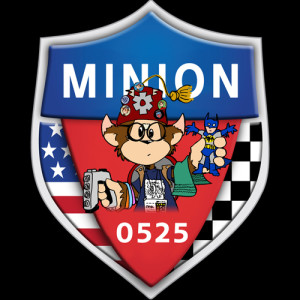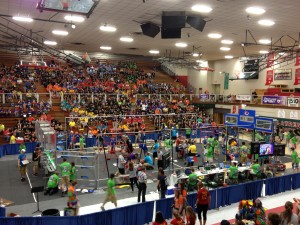 I have discovered there are now two kinds of animated films in the world. Those with fart jokes, and those without. You probably could also say that there are those where the studios that hire big name stars and promote the film as “with the voice of… insert bazillion dollar actor’s name here” and those where the voice actors names aren’t more important the story. I bet you can guess which ones I prefer.
I have discovered there are now two kinds of animated films in the world. Those with fart jokes, and those without. You probably could also say that there are those where the studios that hire big name stars and promote the film as “with the voice of… insert bazillion dollar actor’s name here” and those where the voice actors names aren’t more important the story. I bet you can guess which ones I prefer.
Tag: kinda sorta rant
A Year in MINIons- MINIon #0525
 I am outraged, simply outraged at the number of people who don’t know the difference between two major holidays! On this May 25th, as pop culture loving Americans we need to make sure that everyone knows the difference between Towel Day, and Geek Pride Day. So here goes my meager attempt to enlighten you…
I am outraged, simply outraged at the number of people who don’t know the difference between two major holidays! On this May 25th, as pop culture loving Americans we need to make sure that everyone knows the difference between Towel Day, and Geek Pride Day. So here goes my meager attempt to enlighten you…
Towel Day is celebrated annually on the 25th of May as a tribute to the author Douglas Adams by his fans. On this day, fans carry a towel with them, as described in Adams’ The Hitchhiker’s Guide to the Galaxy, to demonstrate their appreciation for the books and the author.
A towel, it says, is about the most massively useful thing an interstellar hitchhiker can have. Partly it has great practical value. You can wrap it around you for warmth as you bound across the cold moons of Jaglan Beta; you can lie on it on the brilliant marble-sanded beaches of Santraginus V, inhaling the heady sea vapours; you can sleep under it beneath the stars which shine so redly on the desert world of Kakrafoon; use it to sail a miniraft down the slow heavy River Moth; wet it for use in hand-to-hand-combat; wrap it round your head to ward off noxious fumes or avoid the gaze of the Ravenous Bugblatter Beast of Traal (such a mind-bogglingly stupid animal, it assumes that if you can’t see it, it can’t see you — daft as a brush, but very very ravenous); you can wave your towel in emergencies as a distress signal, and of course dry yourself off with it if it still seems to be clean enough.
More importantly, a towel has immense psychological value. For some reason, if a strag (strag: non-hitch hiker) discovers that a hitchhiker has his towel with him, he will automatically assume that he is also in possession of a toothbrush, face flannel, soap, tin of biscuits, flask, compass, map, ball of string, gnat spray, wet weather gear, space suit etc., etc. Furthermore, the strag will then happily lend the hitch hiker any of these or a dozen other items that the hitch hiker might accidentally have “lost.” What the strag will think is that any man who can hitch the length and breadth of the galaxy, rough it, slum it, struggle against terrible odds, win through, and still knows where his towel is, is clearly a man to be reckoned with.
Hence a phrase that has passed into hitchhiking slang, as in “Hey, you sass that hoopy Ford Prefect? There’s a frood who really knows where his towel is.” (Sass: know, be aware of, meet, have sex with; hoopy: really together guy; frood: really amazingly together guy.)
Geek Pride Day on the otherhand, is celebrated each year on May 25th (the anniversary of the release of the first Star Wars film- entitled “Star Wars” before George Lucas started changing things around). It is a day in which everyone should embrace their geekiness, although there is an actual manifesto/code that goes along with Geek Pride Day, defining the rights and responsibilities of every Geek, while they don’t apply to everyone, it’s a good place to start.
Rights:
- The right to be even geekier.
- The right to not leave your house.
- The right to not like football or any other sport.
- The right to associate with other nerds.
- The right to have few friends (or none at all).
- The right to have as many geeky friends as you want.
- The right to be out of style.
- The right to be overweight and near-sighted.
- The right to show off your geekiness.
- The right to take over the world.
Responsibilities:
- Be a geek, no matter what.
- Try to be nerdier than anyone else.
- If there is a discussion about something geeky, you must give your opinion.
- To save and protect all geeky material.
- Do everything you can to show off geeky stuff as a “museum of geekiness.”
- Don’t be a generalized geek. You must specialize in something.
- Attend every nerdy movie on opening night and buy every geeky book before anyone else.
- Wait in line on every opening night. If you can go in costume or at least with a related T-shirt, all the better.
- Don’t waste your time on anything not related to geekdom.
- Try to take over the world!
Beep! Howdy Sports Fans!
For those who know me well, you know that sports have never been my thing. My older brother was athletic so in order to avoid competition, I avoided almost all forms of competition. It didn’t help much, my parents still compared us, but at least I wasn’t trying to directly compete or be like him. I tried my best to learn from my older brother by not doing anything he did.
I joke about my lack of knowledge when it comes to any sports. I know the basic rules of the important “All-American” sports but don’t really follow any. I know who my local sports franchises are and firmly believe that their business model is a little skewed since they make millions of dollars and still ask for handouts from the communities they live in, holding us hostage with threats of leaving if they don’t get tax breaks or bigger stadiums or key players out of jail, or whatever. I find it sad that many of my students nowadays think that their only way to be successful is through sports and pour more effort into (pick a sport) than learning. In my teaching career I have personally taught one child who became a professional athlete. 26 years of teaching, average of 24 kids in each class (actually a lot more since for about 6 years I taught every student in a school of around 700)- only one that I know of went pro. Last week I had a chance to check out a sport/competition that I think is worthy of not only our support as a community, but also one that might actually make the world a better place… Robotics.
Last week I started off by dropping by a robotics camp being put on by our local high school. The camp dealt with VEX robotics and instead of dropping by, I decided to help out where I could for the week. The campers formed teams and designed and built their own robots to complete a task. The competition had the robots move balls around the field and put them in a goal. At the end the robots had to knock a “bonus ball” into the play, score with it and return to their starting place before time ran out. Rounds were 2 minutes each and the robots were each controlled via a game controller by a “pilot.”
Throughout the week the teams of campers designed and redesigned their robot, trying out different things. Some teams were very flexible while others stuck with the same idea thinking if they try hard enough it will work. “Insanity: doing the same thing over and over again and expecting different results.” – Albert Einstein, one of the team captains reminded me of this quote at the start of camp, yet, his team was one that never varied from their initial design, even when it wasn’t as successful as the others on the field of play. The hardest part, as an adult, was to try to lead them down the path of discovery subtly without saying- “Look, your design isn’t working. You have time, try something else.” In the end there was a brief competition, a winning team was determined, and candy bars were given out to the winners.

So, how is this different than many other “sports”? Well, first all the competition isn’t cutthroat. Each team (robot) competed in rounds in an alliance with (by the time all the rounds finished) all the other teams (robots) at the camp. Your team received points for the alliance winning. Scoring was 2 points for winning, 1 point for a tie, and 0 points for a loss. The Idea was to help every team to be better because you didn’t want to lose any match, so you would want to play with a strongest teammate you could. At the ages these kids were at, that was a difficult concept for them to grasp- you wanted everyone to be strong because in the end, the best robot would win- every match, no matter who they were paired with. In the end the oldest group of students were the winners, experience triumphing over youth.
Friday found the group at the Indiana Robotics Invitational and here, while the overall goal was similar, the robots were more complex since the task put before them was much more complex. The competition here put three teams (robots) on each side working to get as many points as possible. The round was divided into basically two sections (automated and piloted). The round began with the robots running a program for 15 seconds, then the human pilots took over. The goal- score as many points as possible. How? Well this year (each year the task is different) the robots were designed and built to throw a frisbee through a target. That was the first goal, three targets, get as many frisbees as possible through the targets. The course also had two towers, points could be gained by getting a frisbee to the top of the tower, but wait, there’s more. Just as the campers could gain points for being back in their parking place, these robots got points for hanging from the tower, the higher the robot was, the more points you received.
I know there was more to it than that, but basically that’s what had to happen. So how does that make it world changing? Let’s think about the end results from participating in competitive robotics. You learn practical applications of Science, Math, Engineering and Technology. You gain skills that could help you get into a good college and when you get out actually produce something for the betterment of mankind, not just throw a ball around until your arm (or knees or back) goes out, then sit around talking about your glory days. You could take what you learned and still use it even when you’re old and grey filled with aches and pains.
I never played sports (fine full disclosure- I played soccer in 3rd & 4th grade and briefly tried springboard diving and swimming, I was lousy) – like I said, that was my brother’s thing. So I don’t understand the competitive culture behind sports, but even now at the elementary school I see the cliques forming- the kids who are told by their pee wee league coach to wear their jerseys to school the Friday before a game, to impress everyone. Fights and trash talking happen between rival teams and this is at elementary school… so sad. I’m waiting for someone to get the bright idea of taking out a key player during recess, so their team can win. I did not see signs at the robotics competition reminding parents that it is only a game. Then again these kids were not the all-star varsity lettering BMOCs and bullies, these were geeks and nerds, people with a passion for engineering and for computers, and yes, there were girls in the mix too. I would suggest finding out if your local school has a robotics program and go talk to the kids and the mentors. I’m sure you’d be amazed at what they are doing. Unlike most high school sports, this is a program I can actually see a benefit, and will support my local team. Try this- instead of buying a jersey with the number of some guy who will retire or be traded in a few seasons (causing you to have to buy another jersey), take that money and make a donation to your local high school robotics program. Our robot overlords would approve and might let you live after they take over.
One of the Semifinal Matches at the IRI video of the entire event can be found on their YouTube Channel
If you want more information about Robotics Programs for students check out-
US FIRST (For Inspiration and Recognition of Science and Technology) – One of the governing bodies for Robotics Competitions at the high school level
VEX Robotics – Another governing body that has programs for elementary schools all the way up to high schools
FIRST LEGO League – A competition for elementary school students put on by FIRST using LEGO Mindstorms robots
Jr. FIRST LEGO League – A competition dealing with engineering concepts (pre-robotics) using LEGO bricks for students from 1st to 3rd grade.

